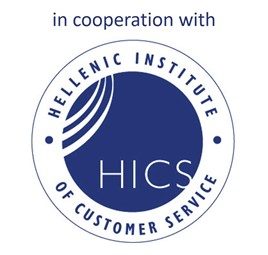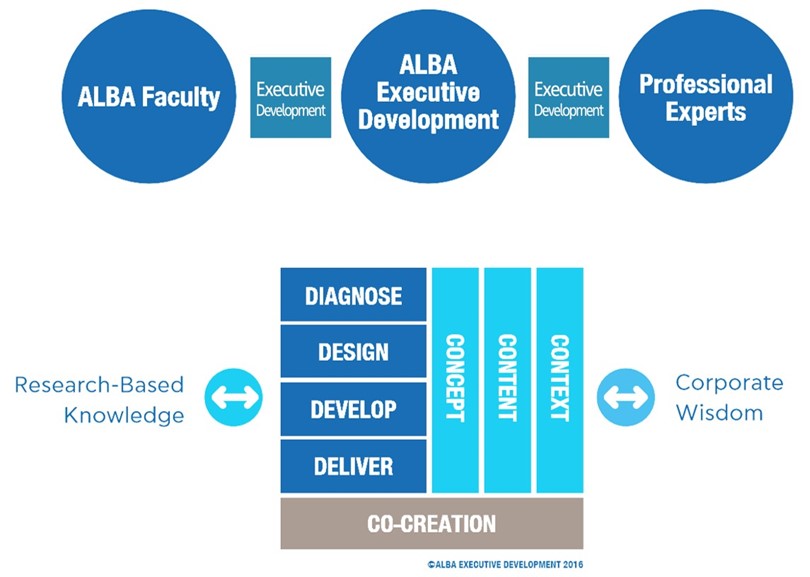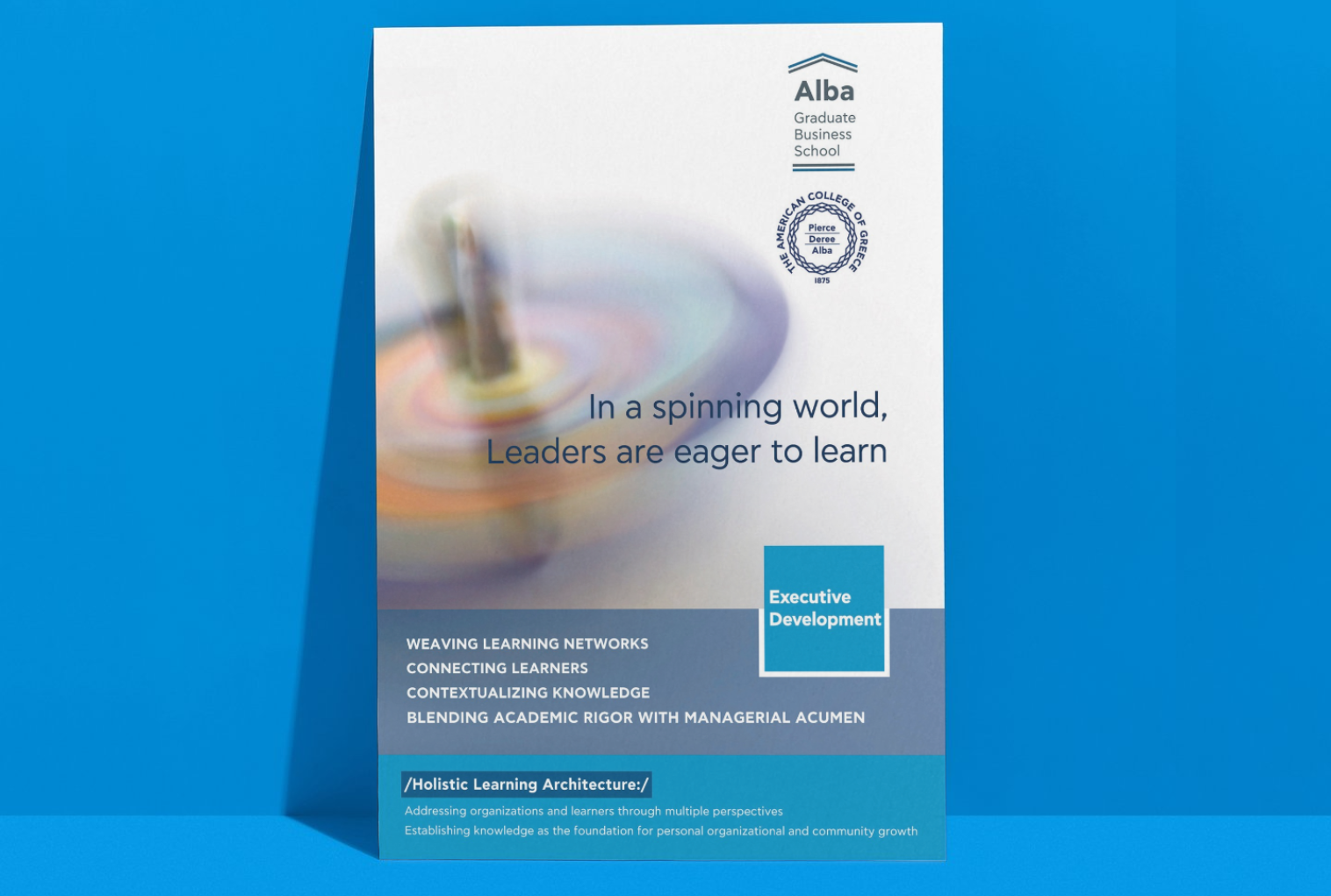Perspectives of Leadership: Thriving Customer Service Leaders Program
OVERVIEW AND SCOPE

This new advanced program offers a holistic view on leadership.
It begins with a focus on the self and examines the issue of psychological safety and the ways it is developed and experienced both by the leaders and their teams; it continues with a focus on core tools and competencies for effective leadership, and it concludes with a focus on strategic leadership and the development of a strategic mindset that leads the organization and its units towards growth.
Learning Objectives
By using a blend of creative group exercises, interaction and theory, participants will acquire new knowledge and will have the chance to practice advanced skills for dealing with customer service challenges and elevating workplace culture.
Program Dates & Venues
The first sessions of the program will be conducted via the learning platform Zoom.
The last session will take place at Alba premises, Xenias 6-8, Athens. Please refer to the table below:
Day 1: Thursday 4/12/2025 time 9:30-13:30 ZOOM
Day 2: Friday 5/12/2025 time 9:30-13:50 ZOOM
Day 3: Thursday 11/12/2025 time 9:30-15:30 ZOOM
Day 4: Friday 12/12/2025 time 9:30-17:30 Alba premises
ALBA EXECUTIVE DEVELOPMENT APPROACH

PROGRAM INFORMATION
Program Dates & Venues
The first sessions of the program will be conducted via the learning platform Zoom.
The last session will take place at Alba premises, Xenias 6-8, Athens. Please refer to the table below:
Day 1: Thursday 4/12/2025 time 9:30-13:30 ZOOM
Day 2: Friday 5/12/2025 time 9:30-13:50 ZOOM
Day 3: Thursday 11/12/2025 time 9:30-15:30 ZOOM
Day 4: Friday 12/12/2025 time 9:30-17:30 Alba premises
Program Cοurses:
Self – Regulation course
This 4-hour course is tailored for professionals looking to broaden their leadership skills through a richer understanding of the relationship between psychological and biological safety, inspired by the transformative Polyvagal Theory (Porges, 1995). This understanding will provide participants with tools to effectively identify and manage various emotional reactions in themselves and their teams.
The course integrates experiential learning with theory, featuring group activities designed to help participants develop tactics to cultivate safe and emotionally regulated work environments.
During the program participants will:
- Be introduced to the way our Autonomic Nervous System is programmed to work to ensure survival and keep us safe.
- Learn how responses of Fear, Anger, Stress, Shut-Down or Mastery are normal and serve an adaptive function within our system.
- Link all the above with common emotional reactions that take place within the workplace or other contexts.
- Learn to identify triggers and signals that lead to dysregulation and away from safety both within individuals and in communal/ organizational contexts.
- Practice simple techniques that increase safety, self-regulation and relational regulation.
Leader as Coach Course
The "Leader as Coach" training session is designed to equip the participants with essential coaching skills to enhance team performance and foster a positive work environment. This comprehensive interactive 6-hour training covers four key topics: Connect, Empower, Develop, Ask, and Listen. Together we will explore the following topics, combining theory, exercises and role playing:
Connect:
- The essentials of communication
- Building rapport and trust
- Adaptive Listening
- Communicate with Empathy
Empower:
- Identify and manage our biases
- Motivate people
Develop:
- The mindset of growth
- Giving and receiving feedback
Ask & Listen
- Powerful questions
- A framework of a coaching discussion
Negotiations and Conflict Management course
The course on Negotiations and Conflict Management aims to equip participants with essential strategies to effectively negotiate deals and manage conflicts in both personal and professional settings. The course will cover the following topics:
- Introduction to Conflict Management and Negotiations: Overview of fundamental concepts, principles, and frameworks.
- Communication Skills: Techniques for effective listening, assertive communication, and persuasive speaking.
- Conflict Resolution Styles: Analysis of different approaches to managing and resolving conflicts.
- Negotiation Strategies and Tactics: Exploration of various negotiation strategies, including integrative and distributive bargaining.
- Psychology of Negotiation and Conflict Management: Understanding the psychological factors that influence human behavior and outcomes in negotiations.
- Practical Applications: Hands-on practice through role-playing to learn techniques through real-world scenarios.
Strategy in a V.U.C.A. world course
Companies operate in a Volatile, Uncertain, Complex and Ambiguous (V.U.C.A.) market environment. Technology through globalization and the internet rapidly disrupts industries, business models operation processes, challenging existing companies and helping others to emerge. Long term strategies assume a stable market environment but in a V.U.C.A. business environment the ability of the company to quickly adjust to the new disruptive forces in the market require strategic agility and adaptability.
At the same time, companies function in industries that dynamically evolve through a continuous interaction among the rest of the companies in the industry. This particular interaction (strategic interaction) shapes up the strategy of the company that is finally articulated in the company’s strategic plan. A certain thinking framework (“Strategic Thinking”) is the foundation for the development of the company’s strategy and its strategic plan. The course develops certain principles and frameworks that help managers to shape up the strategy and develop the strategic plan of their organizations. Using a game theoretic approach (non-cooperative and cooperative games), competition and coopetition are analyzed based on the key strategic principles of strategic interdependency and strategic foresight. Also, the particular thinking framework is applied in both organizations with traditional business models as well as platforms and ecosystems.
PARTICIPANT PROFILE
The Program is addressed to
- Senior Customer Service Unit Leaders
- Customer Service Leaders facing career transitions (new organizations, new teams, new roles)
- Executives that have completed the Executive Diploma in Customer Service Management and aspire to deepen their knowledge and skillset in Customer Service Leadership, in order to be prepared for the next step in their career
FACULTY
CONTACT
To request more information please contact
Mrs. Maria Karadeli
Training Coordinator & P.R., Hellenic Institute of Customer Service
Tel: +30 210 3001022
email: [email protected]r
To get in touch with ALBA Executive Department please use the below information
Mrs. Maria Pappa
Tel.: +30 210 89.64.531-8
Fax: +30 210 89.63.302
e-mail: [email protected]
We would be pleased to address any enquiry you might have and to assist you in any way we can.







